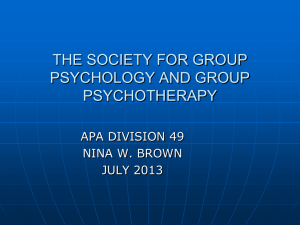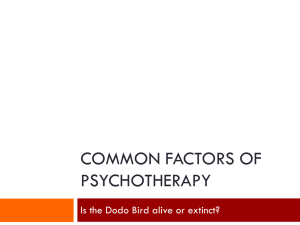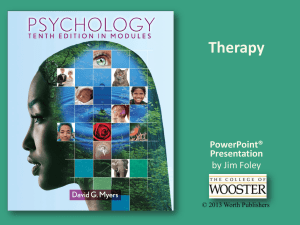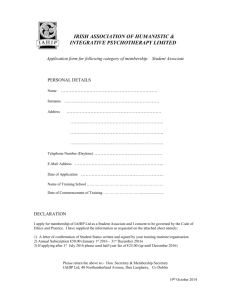File
advertisement
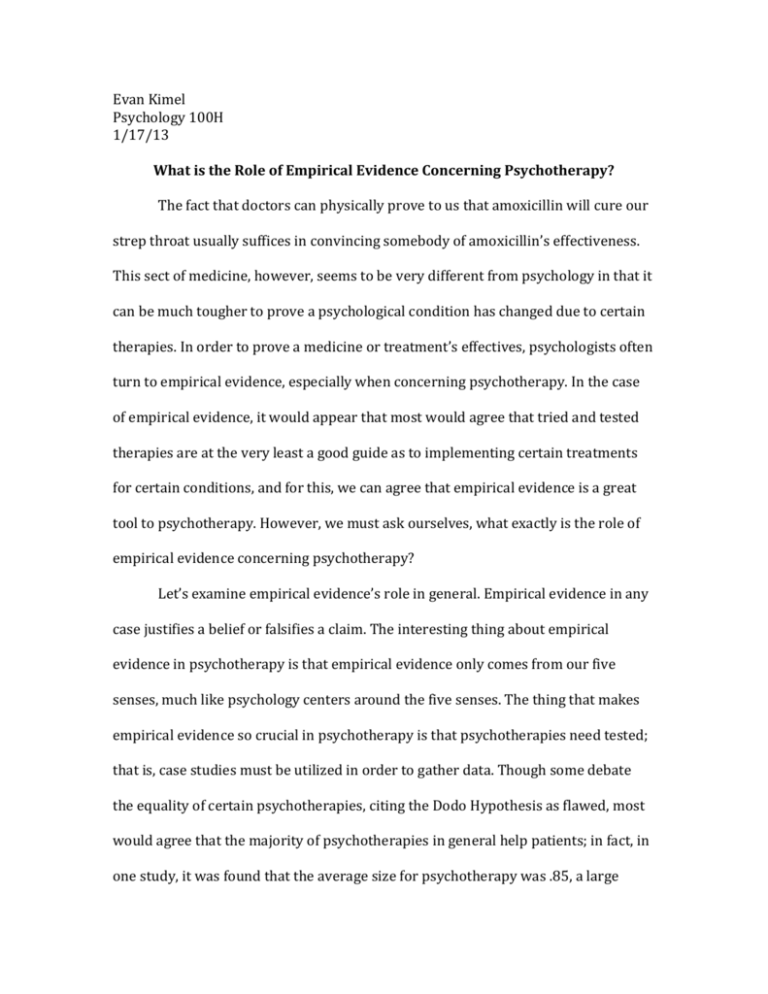
Evan Kimel Psychology 100H 1/17/13 What is the Role of Empirical Evidence Concerning Psychotherapy? The fact that doctors can physically prove to us that amoxicillin will cure our strep throat usually suffices in convincing somebody of amoxicillin’s effectiveness. This sect of medicine, however, seems to be very different from psychology in that it can be much tougher to prove a psychological condition has changed due to certain therapies. In order to prove a medicine or treatment’s effectives, psychologists often turn to empirical evidence, especially when concerning psychotherapy. In the case of empirical evidence, it would appear that most would agree that tried and tested therapies are at the very least a good guide as to implementing certain treatments for certain conditions, and for this, we can agree that empirical evidence is a great tool to psychotherapy. However, we must ask ourselves, what exactly is the role of empirical evidence concerning psychotherapy? Let’s examine empirical evidence’s role in general. Empirical evidence in any case justifies a belief or falsifies a claim. The interesting thing about empirical evidence in psychotherapy is that empirical evidence only comes from our five senses, much like psychology centers around the five senses. The thing that makes empirical evidence so crucial in psychotherapy is that psychotherapies need tested; that is, case studies must be utilized in order to gather data. Though some debate the equality of certain psychotherapies, citing the Dodo Hypothesis as flawed, most would agree that the majority of psychotherapies in general help patients; in fact, in one study, it was found that the average size for psychotherapy was .85, a large effect; this meant that the average person who received psychotherapy was better off than 80% of those who did not. In order to confirm whether or not a treatment is working, said treatment must be attempted on a patient. The experiment, should it be a success, may then be replicated by another researcher. If the process has yielded the same result time and time again, it can be said that empirical evidence has been gathered. What is done with this evidence is what matters. Some would claim that all psychotherapies are equally effective. Some would claim that they aren’t. There is evidence to both sides; it is empirical evidence that helps to clearly define the truth in the matter. To challenge the Dodo Bird verdict, J. Siev and D.L. Chambless conducted a metaanalysis comparing CBT and relaxation, two treatments for anxiety disorders, by trying them on panic disorder and generalized anxiety disorder. It was found that CBT outperformed relaxation techniques for panic disorder, yet the two techniques were equal on all fronts for generalized anxiety disorder. In contrast to this, a 2001 analysis found that the therapeutic alliance—the strength of the bond between a therapist and his or her client—accounts for about 7 percent of therapeutic effectiveness but that the actual type of psychotherapy at work accounts for only about 1 percent. Most of the remaining 92 percent is presumed to be caused by other factors. So the question is, are psychotherapies equal? Perhaps. Perhaps not. Even the author of that same 2001 study noted that this conclusion only held true to bona fide experiments. Empirical evidence’s role in psychotherapy is to help decide on a case-bycase basis which psychotherapy is most effective in that certain situation and why. For example, it would be foolish to attempt rebirthing therapy instead of cognitive-behavioral therapy on most psychological conditions, but we wouldn’t know this definitively without empirical evidence. The issue is, there are over 500 different schools of psychotherapy, and we do not know for sure which are more effective than others pertaining to certain conditions. By continuing to gather empirical data, we can hope for a future where we can give patients an ideal treatment based on successful past cases. Works Cited Slife, Brent. Taking Sides. 17th Edition. Print. Arkowitz, Hal, and Scott Lilenfeld. "Are All Psychotherapies Created Equal?." Scientific American. N.p.. Web. 16 Jan 2013. <http://www.scientificamerican.com/article.cfm?id=are-all-psychotherapies-createdequal&page=2>. . "Psychotherapy Is Effective but Underutilized, Review Shows." Science Daily. N.p.. Web. 16 Jan 2013. <http://www.sciencedaily.com/releases/2012/08/120809190641.htm>.

